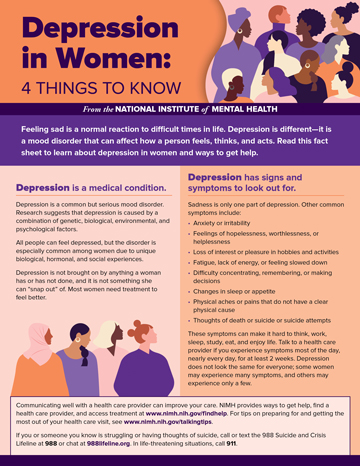Depression in Women: 4 Things to Know
Feeling sad is a normal reaction to difficult times in life. Depression is different—it is a mood disorder that can affect how a person feels, thinks, and acts. Read this fact sheet to learn about depression in women and ways to get help.
1. Depression is a medical condition.
Depression is a common but serious mood disorder. Research suggests that depression is caused by a combination of genetic, biological, environmental, and psychological factors.
All people can feel depressed, but the disorder is especially common among women due to unique biological, hormonal, and social experiences.
Depression is not brought on by anything a woman has or has not done, and it is not something she can “snap out” of. Most women need treatment to feel better.
2. Depression has signs and symptoms to look out for.
Sadness is only one part of depression. Other common symptoms include:
- Anxiety or irritability
- Feelings of hopelessness, worthlessness, or helplessness
- Loss of interest or pleasure in hobbies and activities
- Fatigue, lack of energy, or feeling slowed down
- Difficulty concentrating, remembering, or making decisions
- Changes in sleep or appetite
- Physical aches or pains that do not have a clear physical cause
- Thoughts of death or suicide or suicide attempts
These symptoms can make it hard to think, work, sleep, study, eat, and enjoy life. Talk to a health care provider if you experience symptoms most of the day, nearly every day, for at least 2 weeks. Depression does not look the same for everyone; some women may experience many symptoms, and others may experience only a few.
Communicating well with a health care provider can improve your care. Learn about ways to get help and find a health care provider or access treatment. Find tips for talking with a health care provider to improve your care and get the most out of your visit.
If you or someone you know is struggling or having thoughts of suicide, call or text the 988 Suicide and Crisis Lifeline at 988 or chat at 988lifeline.org . In life-threatening situations, call 911.
3. Certain types of depression are unique to women.
Certain types of depression occur at specific stages of a woman’s life. Pregnancy, the postpartum period, the menstrual cycle, and perimenopause are associated with physical and hormonal changes that can bring on a depressive episode in some women.
- Premenstrual dysphoric disorder is a more intense form of premenstrual syndrome, or PMS, that occurs in the weeks before menstruation. The disorder causes severe symptoms, such as depressed mood, anger or irritability, suicidal thoughts, appetite changes, bloating, breast tenderness, and joint or muscle pain.
- Perinatal depression occurs during pregnancy or after childbirth. It is more than the “baby blues” many new moms experience after giving birth. Women with perinatal depression feel extreme sadness, anxiety, and fatigue that may make it difficult to carry out daily tasks, including caring for themselves or others. Learn more about perinatal depression.
- Perimenopausal depression affects some women during the transition to menopause. Whereas abnormal periods, problems sleeping, mood swings, and hot flashes are common during the menopause transition, more extreme feelings of irritability, anxiety, sadness, or loss of enjoyment may be signs of depression.
4. You can get help for depression.
Even the most severe depression can be treated. Common treatments are antidepressant medication, talk therapy (virtual or in person), or a combination of medication and therapy.
There is no “one-size-fits-all” for treatment. It may take trial and error to find the best one for you. A health care provider can explain the different options and help you choose the best treatment based on your symptoms. With help, you can feel better.
Learn more about treatments for depression.
Find additional resources
The following agencies have more information on depression in women:
- Depression (Office on Women’s Health)
- Depression Among Women (Centers for Disease Control and Prevention)
- Women and Depression (U.S. Food and Drug Administration)
The Substance Abuse and Mental Health Services Administration has an online treatment locator to help you find mental health services in your area.
Reprints
The information in this publication is in the public domain and may be reused or copied without permission. However, you may not reuse or copy images. Please cite the National Institute of Mental Health as the source. Read our copyright policy to learn more about our guidelines for reusing NIMH content.
U.S. Department of Health and Human Services
National Institutes of Health
NIH Publication No. 23-MH-4779
Revised 2023

